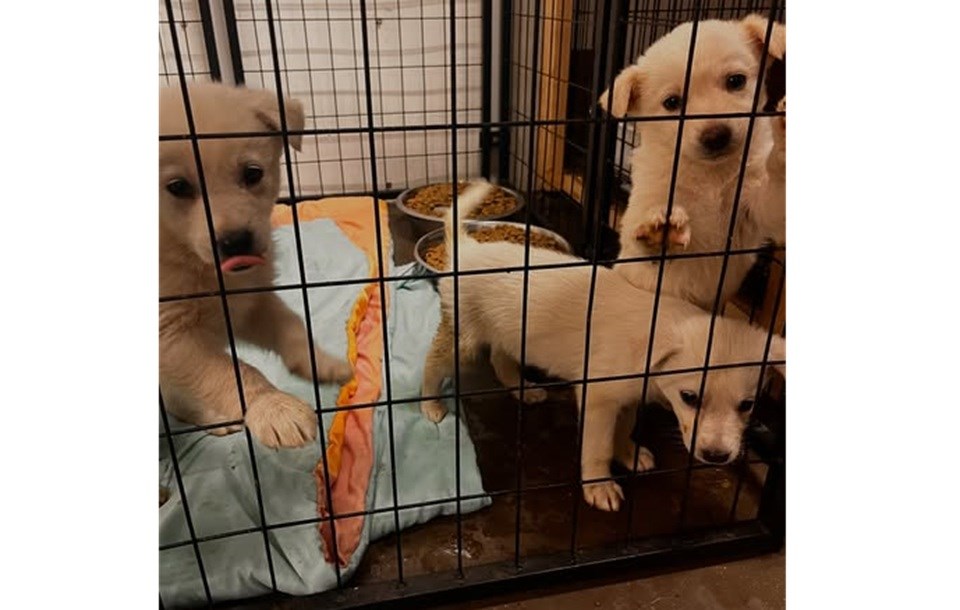NORTH BATTLEFORD - On June 2, staff and volunteers from the Battlefords Humane Society worked to intake six dogs from Northern Animal Rescue, as part of the many rescue efforts to help pets escaping the northern wildfires.
"A worker from the rescue drove the dogs nine hours to safety. Because of her selflessness, Sailor and Bru, Callie, and three little pups are all safe in our shelter tonight," Battlefords Humane Society posted on Facebook.
As the fires come closer and closer to their home, SPCAs, Humane Societies, and Rescues all across the province are opening their doors to northern animals in need.
"We’re grateful to be able to help our fellow animal lovers in this challenging time," the Battlefords Humane Society said in the post. "We are wishing the very best for all who are impacted by the wildfires, and our hearts go out to you all and your furbabies."
During a news conference on June 2, Steve Rogers, Saskatchewan Public Safety Agency (SPSA) vice-president of operations, talked about what is being done to help pets left behind as people were evacuating wildfires.
On a question that pets aren't allowed on the buses for people evacuating, and what is being done to help the pets, Rogers said that there are some options.
"In some evacuations, they are not allowed on the buses. Many people are self-evacuating, so the options are sending your pet with someone who is driving out," he said. "The other end of that equation, is there are some hotels that can't take the pets. So they will have to be boarded or kept with family and friends."
Rogers added that in isolated locations where pets have been left behind, the SPSA and many local community charity groups have made efforts to get pet food into those communities to be put out for those pets, even though the owners may have evacuated.
"We are making efforts to make sure those pets are at least getting some food and some support in those communities," he said.
Evacuee Vivian Ruiz-Arcand said she saw pictures of dogs left tied up that "didn't have a chance."
"That's really hard to see. Yeah, if people didn't have the opportunity to bring them. Some people did leave pets behind thinking they would be back shortly."
Her family were lucky they were able to bring their cat when they evacuated from La Ronge.
"We were able to bring our cat, but not everybody was able to evacuate in their own vehicle because not everybody has a car," she said. "I know of one friend who evacuated in a truck, like a cab crew truck. So it was her, her three kids, three dogs, two cats and a neighbour in a truck. And they waited hours and hours. The dogs have needs. The cats have needs. The kids have needs.
"So I guess just to add to that, the Northern Animal Rescue [that's been helping evacuate the pets], like hats off to you, but people need to know they are a volunteer organization," Ruiz-Arcand added.
Saskatoon Westview MLA April ChiefCalf, who lived and worked with her husband in La Ronge for almost two decades, had this to share.
"There's a Northern Animal Rescue [NAR] organization and many folks stayed behind [in La Ronge] to help gather up pets," she said. "And it was so critical.
"So my friend and my daughter's mother-in-law was at the Uniplex yesterday with dogs in cages and she got trapped there. We were afraid we were going to lose her," she added. "She stayed behind to rescue other people's animals that they couldn't take with them. And she put her own life at risk doing this.
ChiefCalf noted it was was terrifying.
"The Northern Animal Rescue, NAR, they put out a message saying that they had to leave too."
"It was critical and they just couldn't round up all the pets," she said.
A NAR representative told SaskToday that NAR had to leave some animals behind on June 3 during the evacuation, but was able to go back on June 4 to help more animals in the evacuation process to transport out animals to different locations in the province.
"There are many different individuals and organizations that have helped out to house animals for us," she said. "We had many donations - monetary and equipment - and people helping with transport."
She added that the Lac La Ronge Indian Band has also helped in evacuating animals.
"It's been a community effort," the representative said.
She noted it is difficult to rescue all the pets however, because some evacuees left their pets inside their homes and NAR isn't able to reach those animals because the homes are locked and the organization can't access these homes.
- With files from Jon Perez

.png;w=120;h=80;mode=crop)


